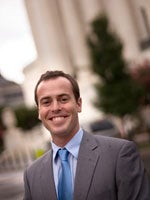This is the first in a series of profiles looking at the legal work and projects pursued by Harvard Law students this summer.
When Thomas Ferriss ’11 accepted an offer to be a legal fellow for Rhode Island Senator Sheldon Whitehouse, a member of the Senate Judiciary Committee, he knew he was taking a gamble. Ferriss’s hope was to work on a Supreme Court confirmation hearing, but Justice John Paul Stevens had yet to announce his retirement. As it turned out, funded by the HLS Office of Public Interest Advising and a Heyman Fellowship, Ferriss spent much of the summer becoming an expert on the work of Elena Kagan, flagging issues that might draw political attention during the hearings. In the process, he combed through some 7,000 pages of documents: every merit brief, cert petition, and amicus brief filed during her tenure as solicitor general, along with all of her academic writings. He came across few surprises in his review: “There were no fireworks. She doesn’t use bombastic language or make big, far reaching claims. She’s a moderate who focuses on the case at hand,” Ferriss says.
But there were aspects of the hearings that surprised him. Ferriss had what amounted to a backstage pass, sitting behind the senators for hours at a time. While he notes that “many of the senators and most of their staff members do exhaustive research on the candidates or have a lifetime of experience in certain issues that they believe the Supreme Court needs to address,” at times the hearings skimmed along the surface of the legal issues at hand. In those cases, Ferriss was surprised by the “lack of depth and familiarity with the things that were actually being complained about.” But in a setting known more for pomp and circumstance than bantering, Kagan made deft use of humor to “defuse an otherwise adversarial situation. Tom Coburn or Arlen Specter or Chuck Grassley would be giving her a hard time, and she’d tell a joke that would crack up the room, and frequently even the person asking her questions.”
Ferriss called it a “special circumstance” to be part of the historic process. “As lawyers we think about the Supreme Court a lot and focus on it a lot. It was such a lucky thing to work on the Hill during a Supreme Court confirmation and see how the two branches come together to fill a vacancy.”
Yet it was the other part of Ferriss’s work this summer that ties in more closely with the work Ferriss would ultimately like to do. He helped draft a series of consumer bankruptcy reforms designed to benefit students and small business owners, among others. “Many bankruptcy procedures have been crafted with a focus on large companies rather than middle-class Americans, and other bankruptcy protections have been eroded altogether,” he explains. Ferriss is pursuing a PhD in statistics at Harvard along with his law degree (to his knowledge, it’s a joint degree no one else at the university has tried for). His goal is to apply social scientific tools to emerging legal and policy questions. “A lot of legal choices and policy choices at the end of the day rest on questions of fact, and those questions are really difficult to answer without using rigorous scientific methodology,” he says. Ferriss points to Professor Elizabeth Warren’s empirical research on bankruptcy law as a model. “As an academic I think I could focus my research on legal areas that will further social justice. Reforming bankruptcy laws doesn’t sound very sexy, but it can help people get out of bad situations that are the result of bad policies. I think work like this could lead to having more fair laws on the books.”
—Katie Bacon
